- Home
- Beryl Kingston
Sixpenny Stalls
Sixpenny Stalls Read online
BERYL KINGSTON
Sixpenny Stalls
To Caroline
The Easter Family Tree
Contents
Chapter 1
Chapter 2
Chapter 3
Chapter 4
Chapter 5
Chapter 6
Chapter 7
Chapter 8
Chapter 9
Chapter 10
Chapter 11
Chapter 12
Chapter 13
Chapter 14
Chapter 15
Chapter 16
Chapter 17
Chapter 18
Chapter 19
Chapter 20
Chapter 21
Chapter 22
Chapter 23
Chapter 24
Chapter 25
Chapter 26
Chapter 27
Chapter 28
Chapter 29
Chapter 30
Chapter 31
Chapter 32
Chapter 33
Chapter 34
Chapter 35
Chapter 36
Chapter 37
A Note on the Author
Chapter 1
‘Mr Burdock looks just like Humpty Dumpty, don’t you think so, Papa?’ Caroline Easter said, grinning across the breakfast table at her father. ‘All your dinner guests are jolly funny, aren’t they, but Mr Burdock is the funniest. He’s such a pompous ass.’
It was just after eight o’clock on a dark December morning two days before Christmas and the dining room was miserably cold, for snow had been falling steadily since two in the morning, and although the fire had been lit at six it was hardly giving out any heat at all. Their breath was clearly visible in the chill air, steaming before them with every word, and poor Papa looked positively grey. A little joke about one of his awful dinner guests would cheer him up.
But this one didn’t. He sucked in his breath in that sharp, snorting way that showed he was cross. ‘Caroline!’ he rebuked. ‘That is no way for you to talk about a gentleman.’
‘Why not?’ she said, fighting back at once. ‘It’s true.’
‘It’s unseemly,’ her father said, two deep frown lines scoring his forehead. He was shocked to hear such words coming from a child, but he remained calm, because he was always calm. It was important to him to be in total command of himself and his situation. He was renowned for it, Mr John Henry Easter, Managing Director of the great firm of A. Easter and Sons – Newsagents, the man in command. ‘Come now, I cannot allow you to say unseemly things at my breakfast table. You are ten years old, miss, not a baby. Make some effort to behave yourself properly, if you please.’
‘I always behave myself properly,’ Caroline said, determined not to be put down by his stern tone, ‘I am an Easter.’ She was very proud of being a member of the great Easter family, and now, sitting opposite her father on the other side of his fine oak table, she certainly looked it, for her face was bold with defiance.
‘Then pray try to act like one,’ her father said. ‘You should know by now that you cannot say whatever you please. As an Easter you should exercise a little more decorum.’ If only she could have been more like her dear dead mother; if only she could listen to him patiently now and then and admit her faults instead of arguing back all the time. These constant battles were very wearing.
‘I do exercise decorum,’ Caroline said. ‘I do too.’ Her voice rang sharp as cut-glass in the chill of the room. Really, Papa was being quite ridiculous to make such a fuss over a little joke. Her grandmother would have laughed out loud at it.
‘It is neither decorous nor kind to describe any gentleman as a pompous ass,’ her father said, frowning at her, ‘and certainly not this particular gentleman. Mr Burdock owns some of the most popular newspapers ever published in this city. He puts a deal of trade the way of Easter & Sons. He ain’t a man to be mocked.’ And yet he was pompous. The child was right. As she so often was, in that alarmingly forthright way of hers. It made correcting her extremely difficult.
‘I don’t mock him, Papa,’ Caroline said, sticking her chin into the air. It was such an abrupt, determined movement it made her dark ringlets bounce against her cheeks. ‘He doesn’t know what I said about him. Nobody heard me except you. So how could I be mocking him?’
‘That is not the point,’ John Easter said, maintaining his calm with considerable effort, because her defiance was so provocative. ‘Nobody should have heard you at all. It isn’t the sort of thing a well-bred young lady would ever say.’
Her answer was immediate and infuriating. ‘Nan says it.’ Nan was her grandmother, who had brought her up ever since she’d been a tiny baby. Dear Nan, who took her to fairs and pleasure gardens and water sports, and played all sorts of marvellous games with her, when she wasn’t in London overlooking the business, and treated her to pretty clothes, and a pony all of her own to ride about town, and two shelves full of books to read whenever she wanted. She adored her grandmother and missed her passionately whenever they were required to spend time apart. In Nan’s nice warm dining room in Bury they both said all sorts of things about all sorts of people and nobody ever said they were rude or indecorous. They only laughed. Sometimes Nan would say, ‘My heart alive, you bad crittur!’ but always in tones of pure affection and approval. So why couldn’t Papa be the same? After all, he was Nan’s son, so he ought to resemble her, in one or two things at the very least.
‘Yes,’ her father sighed. ‘I daresay she does.’ The great Nan Easter was always saying things that would have been better left unsaid. Sometimes he wondered whether it had been altogether wise to allow her to bring up his two children after Harriet died. It had seemed the obvious solution at the time and Will had flourished in her care, but Caroline was becoming increasingly and infuriatingly independent, pitting her will against his on every single visit. ‘I daresay she does.’
‘Then I don’t see why I shouldn’t,’ the child persisted.
‘Because you are a young girl and she is a very old lady,’ he explained, trying to be patient with her. ‘Because she is your grandmother and the founder of the firm, and you are not. Because people make allowances for her, considering who she is, which they certainly wouldn’t do for you. All of which you know perfectly well, so I wonder you argue about it.’
‘I don’t argue,’ Caroline said defiantly, feeling rather put down by the weight of all this evidence. ‘I made an observation, that’s all. Miss Murphy says observation is the cornerstone of education.’ Miss Murphy was her governess in Bury. ‘Am I not to make an observation, Papa?’ She looked straight at him across the table, grey eyes flashing, daring him to disagree with her.
‘No, you are not,’ he said, anger gathering in him despite his control. ‘And especially in company.’ When she defied him like this she looked like a goblin, indeed she did, dark and swart and glowering, despite her fashionable ringlets and that expensive woollen dress. That was his mother’s doing too, he thought, scowling at it – rose pink and cream checks overprinted with scarlet flowers for a ten-year-old! No wonder she gets above herself sometimes. ‘If that’s the sort of observation you intend to make, you had better remain silent.’
‘How long for?’ she asked, and the question was a challenge.
‘For as long as I say,’ he told her, ruffled despite himself.
‘All day?’
‘All day if need be.’
‘Am I to remain silent when I come down to meet your dinner guests tonight?’ the child asked,. ‘They’ll think that very odd. I always talk to your dinner guests.’
She is deliberately provoking me, John thought, looking at her bold face. Why must she do it? There is no need to drag this quarrel into the evening. Why can’t she accep
t that she is wrong, apologize, and have done with it?
‘If you wish me to,’ he said coldly, ‘I will explain to them that you are in disgrace for ill-mannered behaviour and not allowed to speak to anyone in consequence. How would you like that?’
She wouldn’t like it at all, and they both knew it, but she had no intention of admitting it and allowing him the victory. ‘As you please,’ she said calmly. ‘’Tis all one to me. I’ll come down and sit mum as a statue if that’s what you really truly want. But they’ll all think it jolly peculiar, I can tell you.’
‘Well,’ her father said, trying to rescue them both from their impasse, ‘we will see about that when the time comes.’ She might be more amenable by eight o’clock in the evening. ‘Come now, eat up your breakfast and let us have no more of this.’
Caroline put a forkful of bacon into her mouth and grimaced. ‘It’s gone cold,’ she said.
‘And whose fault is that?’ he asked, speaking mildly and trying to tease her a little, in the hope that this time she could admit error and grow more reasonable.
It was a vain hope. ‘Not mine,’ she said coolly, looking him straight in the eye, daring him again. ‘I didn’t start all this.’ She had joined battle with him and there was no backing down. If he was going to insist on silence when she was supposed to be talking and everybody would expect her to be talking, then she would fight him to the end.
He was suddenly annoyed beyond patience. ‘Enough!’ he said, and now there was no mistaking the authority in his voice, nor the anger. ‘I cannot endure any more of your rudeness, Caroline. You have been rude to Mr Burdock and now you are being rude to me. You will go to your room, miss, and stay there until you are in a better frame of mind and ready to apologize.’
‘Very well, Papa!’ she said calmly. And she folded her napkin very very slowly and with the most aggravating precision, laid it neatly beside her plate, glared at him and flounced from the room, red skirt swinging.
She even takes her punishment with a flourish, he thought, admiring her despite himself. She behaves as though she is punishing me. Which in a convoluted way she was. For despite her bad behaviour, he was excessively fond of her, even though he knew he would never have been able to tolerate her presence in his house all the time, and even though he looked forward to her visits with a mixture of pleasure and dread. She lightened the routine of a life that had become undeniably dull and unvaried since Harriet’s death. And besides, she was a living reminder of her mother.
In repose she was very like Harriet, for she had the same heart-shaped face and her hair grew in the same attractive widow’s peak in the centre of her forehead, but where her mother had been pale-skinned and gentle, with blue eyes and hair so fair as to be almost silver, Caroline was dark-skinned and turbulent, with eyes the colour of storm clouds and thick curly hair so very dark brown as to be almost black, and unlike her mother, she was very rarely in repose. She was a springtime creature, that was the trouble, brightly coloured, strong tempered, quick and unpredictable, a creature of strong sunlight and sudden showers, and although the sunlight was warming, the showers could drench him with temper before he had a chance to prepare himself for them.
Sighing, he walked across to the fireplace to ring the bell for his man servant. She had taken away all his appetite, wretched child, he thought, as he positioned himself on the hearthrug with his back to the coals. Now he would have indigestion for the rest of the day. And the fire was giving out no heat at all. Even when he stood right in front of it with his heels on the fender and his coat-tails lifted high in the air, he could barely feel any warmth at all.
‘Ah, Tom,’ he said to his valet, when the young man opened the door, ‘I shall be leaving for the Strand in ten minutes. Is my greatcoat ready?’ He was pleased to notice that his calm was almost entirely restored.
‘Yes, sir,’ Tom Thistlethwaite said, ‘and yer gloves and yer muffler, what I’ve took the liberty a’ laying out. And two rugs fer the carriage today, sir. Snowing like billy-oh it is. Sky’s full of it. Can’t be too careful, eh sir?’
‘There’s no heat in this room at all, Tom.’
‘Leave that ter me, sir,’ Tom said at once. ‘I’ll ‘ave that fire going a treat by the time you gets back. Was there any thin’ else, sir?’
‘Ask the housekeeper if she would be so kind as to see me for a moment,’ John said. There were last-minute instructions for the dinner party to attend to before he could leave the house and set out for the comfort of his office in the Strand.
‘She’ll be with you in a jiffy, sir,’ Tom promised, and went bustling out to make sure that she was.
Above his head, Caroline stood beside her bedroom window looking out at the falling snow and the white mound that was all that was left of the garden in the middle of Fitzroy Square. The bare trees were furred with whiteness and so were the railings, which looked coal-black through the curtain of falling flakes, and the cobbles below her were covered with such a thick layer of snow that they appeared quite smooth. She was shiveringly miserable at being treated so unfairly, and the cold air blowing in underneath the window and the depressing dowdiness of the bedroom were making her feel worse. I’m like a poor caged bird, she thought, a poor caged bird in a dirty cage.
There was nothing young and lively in the room except her and the fire. It had been a splendid room once, so people said, decorated in pink and gold and all ready for Will when he was born, but it hadn’t been redecorated since, and Will was eighteen years old and up at Cambridge. Now the ceiling was ochre, and the once-pink fringes that edged the long curtains were an unpleasant dirty grey, and the wallpaper was faded to a dowdy monochrome, patterned here and there with a darker dirtier brown like old tobacco stains. It depressed her just to look at it.
Papa doesn’t care about anything except his work, she thought mutinously, watching him as he climbed into his carriage, stooping against the cold. He doesn’t care about me or he wouldn’t be so beastly. He doesn’t understand how I feel and he doesn’t care. Only Nan understood, and Nan was miles away in Bury St Edmunds.
The thought of her grandmother brought a wave of homesickness so intense it was like nausea. No, she thought, why should I stay here in this dull house and be shamed because I’ve spoken the truth? It’s not fair. I was only trying to cheer him up. I’ll go to Bury, that’s what I’ll do. I’ll go to Bury this very minute. The snow was falling quite heavily now, the flakes swirling in such profusion she couldn’t see the square, but it was only snow. She wasn’t afraid of snow. She’d put on her warmest clothes and her embroidered mantle and her nice new boots and her fur bonnet and her fur muff and she’d go to Bury.
She was dressed in ten minutes and out in the square in twelve, having crept down the stairs while the servants were busy cleaning the dining room, and let herself out of the house so quietly that the front door gave the merest click. I am like a caged bird, she thought, thrilled by what she was doing, escaping from captivity and flying home to my nest. It was exciting and romantic.
But bitterly cold, for a sharp north-east wind was blowing straight at her across the square and the snow was falling so thickly that her mantle was studded with it in seconds. There was nobody else about, although she could hear the muffled sound of horses’ hoofs and a carriage creaking somewhere just out of sight.
She tucked both hands into her muff and began to run, slithering a little where the snow had been flattened by earlier feet, but moving as quickly as she could, partly to keep warm and partly to get away from the house before somebody saw her. It was the first time she’d ever been out on her own in the London streets and she knew it was improper to be walking abroad unchaperoned and that her father wouldn’t approve, and the excitement and release of it filled her with energy.
But she had barely reached the corner of Fitzroy Square and Grafton Street when she heard somebody calling her name. ‘Miss Caroline! Miss Caroline Easter!’
She turned her head at once, fearful but ready to defend hers
elf, and found that a two-horse chaise was scuffling to a halt behind her and that she was looking up through the snow into the eccentric countenance of one of their next-door-neighbours, old Mr Fazackerly, who claimed to be ‘an illustrator, me dear’ but according to Cook had never been seen drawing anything in all the time he’d lived in the square. He was sitting above her in the driving seat, wrapped in a dilapidated rug from his armpits to his knees, and wearing an ancient topper brimmed with snow. He looked even odder than usual, for his wild grey hair was so wet it was sticking to his forehead and his long nose was the colour of port wine and his horsy face was a peculiar greyish-yellow. But he turned out to be a friend in need.
‘No weather to be out walking, me dear,’ he said, taking out a large pocket handkerchief and wiping the end of his nose with a brisk movement to and fro as though it were a bell he was trying to ring. ‘And all on your own too. Where are you off to? I’m on me way to the city to see about a commission so I am. Can I give you a lift?’
‘I’m going to Ludgate Hill, to the Belle Sauvage,’ she told him, ‘to catch a coach to Bury.’
‘To meet your father, doubtless,’ he said. ‘Bury for Christmas, eh.’ And when she didn’t deny it, ‘Hop aboard. I’ll have you there in a jiffy.’
Which he did, or if not in a jiffy, at least in commendable time given the state of the roads and the age of his horses. ‘What luck I was passing, eh?’ he said as they creaked along Tottenham Court Road. ‘Pull that rug right up under your chin, me dear.’ And when they reached the entrance to the coach yard he helped her down most gallantly, as though she were a princess, and wished her ‘Bon voyage!’ before he creaked off into the snow again.
Now that was the proper way to treat an Easter, Caroline thought, as her boots touched the snow. Dear Mr Fazackerly. He’s an omen, that’s what he is, a good omen, a sign that this will be a great adventure. And she went trotting off to the booking office, which was full of bulky passengers and loud with argument. The clerk, who was small and sharp, stood his ground behind the counter like a terrier before a herd of buffaloes, barking to right and left that he couldn’t make the coaches run, not nohow, not he, and that he only had one pair of hands if you please gent’men. And the buffaloes snorted and grumbled and shook the snow from their thick coats and stamped their feet in the puddles they were making.

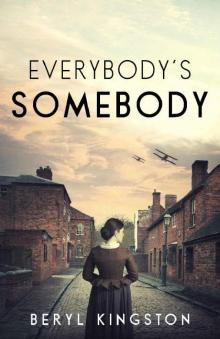 Everybody's Somebody
Everybody's Somebody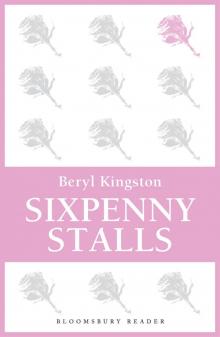 Sixpenny Stalls
Sixpenny Stalls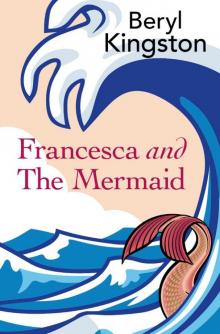 Francesca and the Mermaid
Francesca and the Mermaid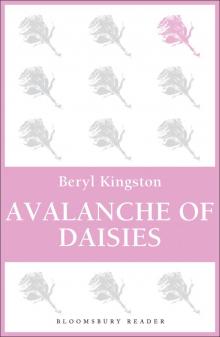 Avalanche of Daisies
Avalanche of Daisies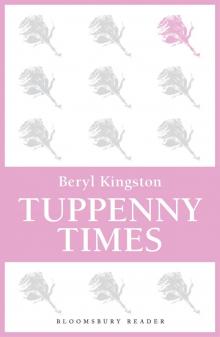 Tuppenny Times
Tuppenny Times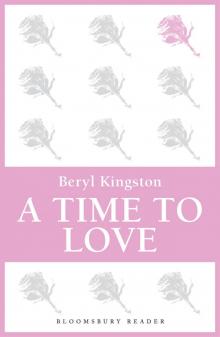 A Time to Love
A Time to Love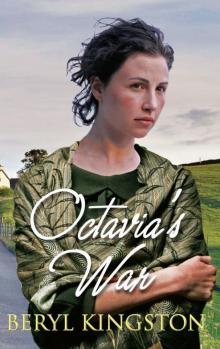 Octavia's War
Octavia's War Gemma's Journey
Gemma's Journey London Pride
London Pride Gates of Paradise
Gates of Paradise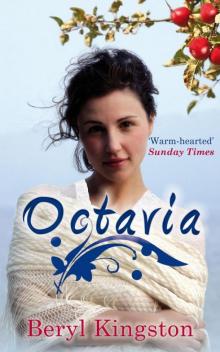 Octavia
Octavia Off the Rails
Off the Rails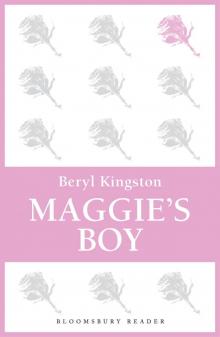 Maggie's Boy
Maggie's Boy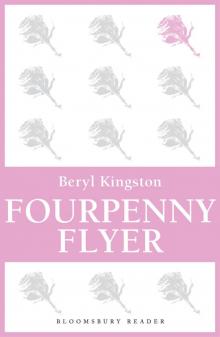 Fourpenny Flyer
Fourpenny Flyer